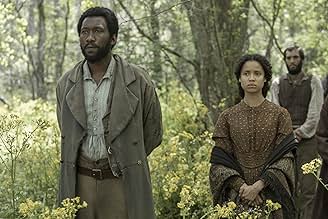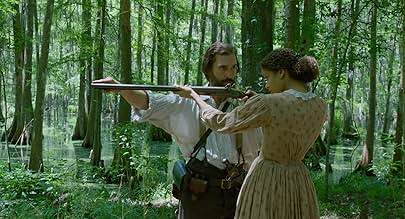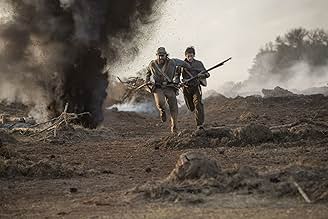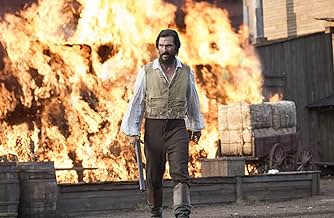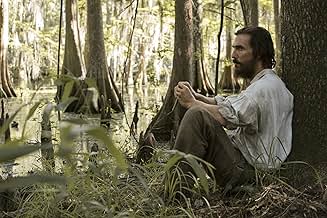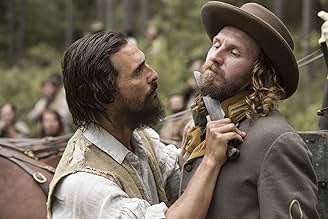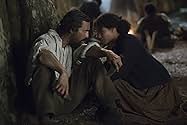Ein desillusionierter Deserteur der Armee der Konföderierten kehrt nach Mississippi zurück und startet als Anführer einer Miliz aus gleichgesinnten Soldaten, entflohenen Sklaven und Frauen e... Alles lesenEin desillusionierter Deserteur der Armee der Konföderierten kehrt nach Mississippi zurück und startet als Anführer einer Miliz aus gleichgesinnten Soldaten, entflohenen Sklaven und Frauen eine Rebellion gegen die konföderierte Regierung.Ein desillusionierter Deserteur der Armee der Konföderierten kehrt nach Mississippi zurück und startet als Anführer einer Miliz aus gleichgesinnten Soldaten, entflohenen Sklaven und Frauen eine Rebellion gegen die konföderierte Regierung.
- Auszeichnungen
- 3 Gewinne & 4 Nominierungen insgesamt
- Annie
- (as Jessica Collins)
- Wilson
- (as Donald Watkins)
Empfohlene Bewertungen
Free State of Jones is a very entertaining film for its performances. Mathew McConaughey is often joked about for his intense style but in this role is where you can see why he's an Academy Award winner. Never mind those impersonations of him. He is John Woodroof, he is Newton Knight. There are also very astute performances from Gugu Mbatha-Raw and Mahershala Ali. It has a slew of characters like in any historical drama but thankfully all are in proper proportions. No wonder it comes from the director of The Hunger Games! Another striking quality of the movie is the soundtrack. Use of traditional as well as original songs bring a noticeable gravity to the narrative.
Apart from the brilliant cinematography and direction, this movie has a unique perspective to dealing with a subject as sensitive as this. It transcends the time and period when this story takes place. While the main thread of the narration tells the legendary story of Knight who goes absconding from confederate army and later creates the Free State of Jones in the midst of raging American Civil War, the other thread follows his great-great-great grandson Davis Knight undergoing trial for mixed-race marriage. Yes, even after 85 years, it was still an issue. When you watch it, you'll find the ridiculousness of it, all the more blatant. Well, this review does not mean to judge the laws of the land nor the way of life of the society. However, if at all you are concerned about the historical accuracy of the film then you should know that its one of the very few period dramas that carries this impressive a list of academic consultants to its credit.
The story of the Free State of Jones is not merely fascinating. It's a glorious story of a glorious man. Much like his namesake who discovered theory of Gravity, Newton Knight discovers something about man. You may understand why it could be discomforting to watch if not with an open mind. It is a jab at the ages of segregationist politics, but unlike most films with liberal agendas, it is not cryptic and morose. Its too direct. Too simple to fathom. It doesn't paint Newton Knight as the saviour but only as a hero that he is. He is as deceived and victimized by the system as everyone else. Only difference is that he had an idea way ahead of his times and he had a chance to implement it. Nature was in favour of the man and even when the times were exceptionally odd for his principles to find ground, he endured. Newton Knight went on to live to a ripe old age of 84 which in itself is astonishing in the 1800s. Thank you Gary Ross for sharing this incredible story on silver screen. Too bad it didn't do well commercially.
I'm not a history buff, but also not opposed to learn about compelling stories, and this was one. Who knew that there was this sub-war going on in the middle of the Civil War, or about this Lincoln-esque southern guy willing to fight the good fight? Knight was an inspiring guy who somehow saw forest through the trees and had courage to do right in a world with wrong going on all around him.
The acting was quite good. I particularly enjoyed fresh faces like Mahershala Ali (Moses) and Gugu-Mbatha Raw (Rachel). The script was not full of period clichés or overly polish, things I appreciated in a movie like Tombstone, but could have been a distraction in Free State which fortunately kept it real.
Matthew McConaughey was excellent in the lead as the gritty Newton Knight. Not as gritty as his brother Rooster, but the grit suits him. Very believable. But this is not a movie that shines due to his good looks, rather from his good acting.
Some of the more critical reviews made comment about FSoJ as "hopelessly adrift", "trips over its own themes as it stumbles aimlessly," "is confusing", and "It's not that the story itself is hard to follow, but Gary Ross' script and direction fail to make clear key personal relationships in the film, and throughout its 2 ¼ hours, it makes the audience wonder where the story is going and whether this movie has much of a point at all."
Wow! All I can tell you is that I did not know the story, and there were some moments where it fumbles, but I kept up with it just fine. For me the movie's strengths far outweighed its weaknesses. Definitely not an average or sub-par movie — the subject matter alone puts it ahead of so many other films.
At times I questioned the casting on some of the supporting roles, but that may be Hollywood conditioning thing, and on reflection this cast probably showed what people were like back in that day.
After the movie I read up on the Davis Knight story. He was the great grandson who was embattled in a miscegenation trial in 1940s Mississippi. He was 1/8 African American, looked white (in the movie) and married a white woman; a crime back in the day in Mississippi. Have to wonder why they didn't prosecute the white wife. Hmm.
It goes to show you how much times have changed: now days in Mississippi Batman can marry Superman, dogs can marry cats, and democrats can marry republicans. You won't see any of that in Raqqa. It's a crazy mixed up world folks.
To sum things up, it's not a perfect movie, and there were some issues making it hard to track at times, but a fascinating sub-plot to the real Civil War, it kept my interest, and the acting was good. Any movie that has me reading up on its story after the film has got to be worth seeing.
It's easy to see why the mass audience didn't like this movie. It's too long, it covers too much ground, and while Matthew McConaughey gives the role of ex-Confederate freedom fighter Newton Knight everything he's got, the character just doesn't jump off the screen like Charlton Heston in BEN HUR or Mel Gibson in BRAVEHEART. Newton Knight is just a lovable guy from the word go (we first see him hugging a scared boy on the battlefield, then holding him while he dies) and he has no personal demons (or prejudices) to overcome. He's not driven by personal anger or passion, just by an abstract love of justice.
Related to that problem is the fact that Newton Knight doesn't square off with one single baddie who's tough enough to make it a real fight. Judah Ben Hur goes up against Massala in the chariot race, and they have a whole lot of personal history. William Wallace goes up against Longshanks, Edward I of England, who is so terrifying he almost jumps off the screen. But Newton Knight just fights a bunch of no-name dastardly Confederate officers, most of whom are portrayed as cowardly or incompetent. None of them have any personal grudge against him and no personal magnetism of their own.
So the bottom line is that the general audience was bored to death.
Now with critics I think the story is a lot more sinister. A lot of left wing critics tried to put this movie down as a "white savior" movie in which a perfect white guy has all the answers and saves everyone. The problem with that argument is that it would apply equally well to a movie like GLORY which covers similar events in the exact same time period. But none of the critics ever attacked GLORY or patronized the personal story of Robert Gould Shaw the way they patronized the story of Newton Knight.
And there's a reason why. Robert Gould Shaw, the hero of GLORY, was a real life officer in the Union army. He was a Harvard graduate from a very genteel, distinguished Boston family who volunteered to command black troops and died leading them in a desperate charge against hopeless odds. Nothing wrong with that man's story. But did you notice the words "Harvard" and "Boston" and "distinguished family?" THAT'S the kind of white savior a left-wing film critic can love.
Someone just like them!
The thing about Newton Knight that turned off a lot of big name critics, (like Richard Brody of the New Yorker) is that he's not Robert Gould Shaw. He's not Harvard. He's not Boston. He's not even a West Point man like Grant or Sherman. Newton Knight isn't a white savior, he's poor white trash. Those kind of people are trash -- and they're supposed to ACT like it!
The idea that a poor redneck farmer would make common cause with a bunch of runaway slaves (without government supervision or a liberal college degree) is just as frightening, just as terrifying, to a New York film critic as it would be to a Mississippi planter. Without poor whites to blame for racism, privileged white liberals have no way to justify their privilege. So it's a fundamental article of faith with them that all poor whites are beyond redemption -- a basket of deplorables, as it were.
If you don't believe me, look up a piece Katha Pollitt published in THE NATION in November 2018. It's called "Conservative White Women Won't Change Their Minds," and it's basically a hate-filled rant against all the white women who voted for Trump. But the real point of the article is that changing their minds is a waste of time. Katha Pollitt needs the white trash to stay trash. All her self-esteem depends on the belief that poor whites were and are and will be trash, now and forever.
This movie proves that isn't true -- and that's why leftist critics had to bury it.
There were a number of Unionist uprisings in the South during the Civil War (a fact that was carefully expunged from my history textbooks, growing up in the South, maybe to justify all the monuments celebrating the glorious Olde South that lurk around public parks and buildings to intimidate black Southerners - I guess). What other purpose could they possibly serve? To celebrate a defeat?
This movie finally points out the obvious: the Confederacy lost the war, but the planter class which owned the Confederacy did their damnedest to win the peace. Instead of being lynched like Mussolini, Confederate leaders returned to their lives, their plantations, just like the war had never happened. Even the slaves they lost were returned to them in the form of unpaid sharecroppers. The misery of the lives of freedmen is one of the strongest images to take away from this film, their alleged freedom snatched from them. No 40 acres and a mule to serve as some form reparation, they went on to endure a century of domestic terrorism at the hand of the KKK.
The movie itself is beautifully and sensitively acted and filmed. There are scenes of great brutality but which are never gratuitous. There are also scenes of great beauty. There are scenes which have enormous relevance to politics in America today where racism is the hallmark of one Presidential candidate and income inequality the hallmark of another.
Claims by the radical left that this movie is about a "white savior" are just silly. If anything, Gary Ross has eliminated most of the real-life incidents which dealt with Newton Knight's own actions on behalf of freedmen, probably to make the film more palatable to the radical left who, like the extreme right-wing can never be satisfied anyway. I do wish the radical left, rather than criticizing well-intentioned liberals like Gary Ross, would attack the real enemy. The State of Mississippi still incorporates the Confederate flag in its state flag... and social justice warriors are quibbling about degrees of "white saviordom"?
Matthew McConaughey hasn't put a foot wrong since Lincoln Lawyer and his performance here is among his best work. American actors are rarely convincing playing period roles but he totally inhabits the role - scraggly beard, greasy hair, terrible teeth and attitude. He looks like the daguerrotype of a tired and desperate Civil War soldier. Gugu Mbatha-Raw has flown too long under the radar: stunningly touching as an early 19th century biracial heiress in Belle and totally believable as a pop star headed for a nervous breakdown in Beyond the Lights, she brings a luminous quality to Rachel a resourceful woman who defined her own path despite the oppression of racist Southern culture.
Mahershala Ali's character won't be found in Prof. Bynum's books. The names of the maroons who fought with the Knight Company have been lost to history, so he is a composite character invented by Gary Ross. His character travels from runaway slave to armed insurgent to voting rights activist in Reconstruction. Ali imbues his character with wit, charm, warmth and extraordinary courage.
Keri Russell is fine in a small role. She gives her heartbroken character dignity and resilience.
Highly recommended.
It may also be a little too quiet and slow moving for some, but the depth to which the film explores obscure American Civil War facts and events, both during and after, makes one curiouser and curiouser to see where it goes.
This is a rare film that you can watch a trailer of, or not, and not have it ruin the film. In fact, it would be very difficult to anyone to write a spoiler for this. It's also something you want to watch from beginning to end, or at least until the credits shift to white text on black. It may not be the ideal theater film, but it definitely is worthy of a hard copy for your book/DVD shelf.
Wusstest du schon
- WissenswertesIn 2016 a document was discovered in the National Archives which was a request by Newton Knight's company to join the Union Army in 1864. It lends validity to Knight's claims.
- PatzerWhen the plantation owner comes back home after the war and walks through the front door, a thermostat is visible on the wall to his left.
- Zitate
Newton Knight: From this day forward we declare the land north of Pascagoula Swamp, south of enterprise and east to the Pearl River to the Alabama border, to be a Free State of Jones. And as such we do hereby proclaim and affirm the following principles. Number one, no man ought to stay poor so another man can get rich. Number two, no man ought to tell another man what you got to live for or what he's got to die for. Number three, what you put in the ground is yours to tend and harvest and there ain't no man ought to be able to take that away from you. Number four, every man is a man. If you walk on two legs, you're a man. It's as simple as that.
- VerbindungenFeatured in The History of Jones County (2016)
- SoundtracksBeautiful Dreamer
Written by Stephen Foster
Top-Auswahl
- How long is Free State of Jones?Powered by Alexa
Details
- Erscheinungsdatum
- Herkunftsländer
- Offizielle Standorte
- Sprache
- Auch bekannt als
- Lucha por la libertad
- Drehorte
- Produktionsfirmen
- Weitere beteiligte Unternehmen bei IMDbPro anzeigen
Box Office
- Budget
- 50.000.000 $ (geschätzt)
- Bruttoertrag in den USA und Kanada
- 20.810.036 $
- Eröffnungswochenende in den USA und in Kanada
- 7.572.206 $
- 26. Juni 2016
- Weltweiter Bruttoertrag
- 25.035.950 $
- Laufzeit2 Stunden 19 Minuten
- Farbe
- Seitenverhältnis
- 1.85 : 1







